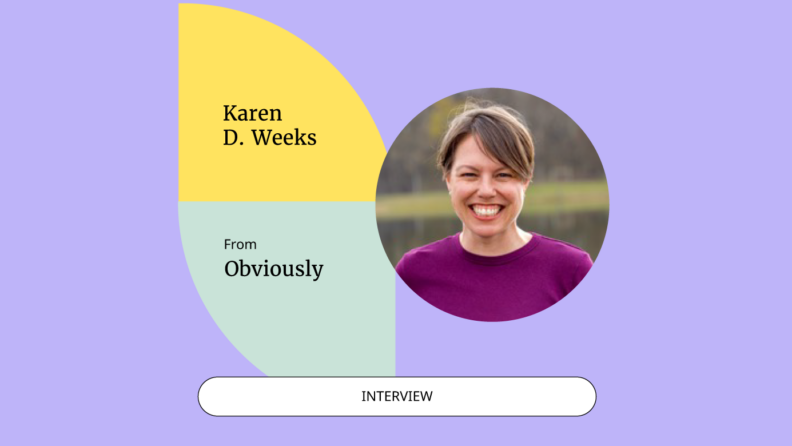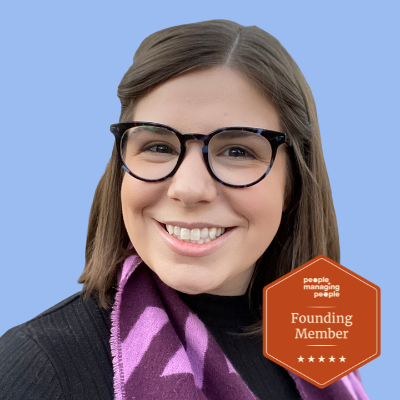Tell us the story of how you got involved in HR/People Operations and leadership. How did your career lead you here?
I actually started in the arts. I was a stage manager and then worked in LA as an assistant to a Talent Agent. I loved that world, but once it was my full time livelihood, I realized it wasn’t the career for me. So after three years I made a career change. I had no idea where to go, theatre was my life.
But after talking to people in “business” I realized what I liked about my previous roles was bringing people together for a shared experience and helping people with their careers. People said I should check out HR and 20+ years later I have never looked back.
Over the years I have held generalist roles and specialist roles. I believe that journey has allowed me to be a stronger leader because I understand and have empathy for everyone on my team because I have been in many of their roles throughout my career.
More recently, I also started a career coaching practice which honestly just gives me a chance to help more people than “just” the people in my current internal company.
In which industries, verticals or sectors have you focused your career?
Most of my career has been in start-ups, specifically in the tech industry
But earlier in my HR career, and now in my current role, I worked at larger global companies.
At the end of the day, I want to be curious about the work my company does so I have always picked industries that intrigued me, products I used and/or I understood the value prop in the market.
Why do so many companies struggle with making HR a priority? What are some common mistakes companies make?
I actually struggled with this at my last company. I know they put people first and really valued the interpersonal impact I had at the organization (and the relationships & trust I build with the team) but I struggled to be able to influence budget or executive partnership on key initiatives.
I think a lot of times it comes from a place of not seeing the power HR can have at previous organizations.
At my current company, I was the HRBP for the COO when he was a brand new manager. He often tells people on the team, “Listen to Karen, she helped make me the leader I am today.” And that was because we worked with a leader who valued and prioritized HR back then.
Our CEO has worked at many good companies because she started her current company. And they were acquired by a company that has a large HR team, great systems and programs and a large investment in culture & development.
But if you are a young in career founder, or a leader that came from organizations that didn’t value HR (or HR was just an admin role), you haven’t seen the value our function can add.
It can’t just be us that is helping change that perspective. We need executive sponsors and other leaders speaking with us to help really impact change of perception.
You’ve been selected to give a keynote address at a major HR and leadership conference. What topic will you discuss and what major points will you touch on?
This is a great question since I do give keynote addresses at HR and leadership conferences. The two topics I tend to focus on is understanding the kind of leader you want to be (or are) and how that is reflected in your team (or is the opposite of people on your team).
This ties directly to building trust as humans, creating open communication, and the importance of 1:1’s to make sure you are supporting, motivating, recognizing and developing them in a style that works for each individual on your team (even if it’s not how you would want to be managed).
The other topic is around authentic cultures. This is demonstrated in how your culture evolves as you grow (or just as your business changes), what is the right culture for your organization (not the shiny, cool thing that is clickbait in the market), and how to recognize subcultures and manage them with purpose (this is a new topic I’m seeing come up more and more).
The theme of course is authenticity, but more importantly how that actually plays out day to day. My goal as a speaker is to always share real stories, things I tried that worked or didn’t (and why), what I learned and at least one thing they can go back to their desk and try immediately.
Have you seen, firsthand, any AI impacts on the practice of HR or people ops? What impacts are you expecting in the next few years?
I’ll be honest, I haven’t had a lot of exposure with AI coming into my role or team. But what I am hearing and where I am encouraging HR people to leverage AI is to help create a starting point.
The bones of a job description are out there, you don’t have to start with a blank piece of paper. But then make sure you customize and make it right for your role (not cookie cutter). Or good interview questions, coaching questions, ideas for engagement survey projects, etc. Or even predict different risk factors for people on your team.
Use it to support the work you are doing and create space for more strategic thinking. Don’t be afraid of it, use it!
What skills have served you best in your career?
There’s two that come to mind first are:
1) Thinking like a product manager. I made a big mistake early in my career when I had the chance to own my first big project. I went into a corner, and spent all this time building the “perfect thing”. But when I emerged I realized it created a bunch of new questions, some things didn’t work (which is natural and expected for the first time doing something) and I didn’t involve my stakeholders and partners enough. I did it in a vacuum.
So anytime someone on my team is working on something, I always talk about creating an MVP, roll it out to a pilot group, think about a phased approach so that we can get feedback to see if it is driving the outcomes we were aiming for, and if not, we can adjust and try again!
2) Balancing the business and the people. We should be people-first, of course. Our role is to say “what is the impact to the team” or help think through the team’s reactions, their questions, etc. But we can’t just put people first, because without a healthy business, it won’t matter.
I would love to give everyone more money, or promote people when they want, or give big bonuses or launch amazing perks and benefits, but only if we can afford it, if it makes sense for our stage of business, if it makes sense across the org (and doesn’t create internal inequity).
I am not saying we need to understand the details of a P&L or a balance sheet. But we need to not just understand how our companies make money, but what our business goals are and then how we can organize, develop, and align our people strategies to hit those goals.
I am the first in an exec meeting to say, “We need to make this tough decision in order to support that business goal. But we need to make this investment over here, otherwise we are being short sighted or we are missing the impact that would have on this other business goal.”
What’s the best advice you’d give someone just starting out in their people operations career, or just starting to transition from a related discipline like HR or organizational development?
Raise your hand for all the projects you can. That is not saying yes to everything, but be open to trying new things.
Early in my career I raised my hand for a compensation analyst role. I hated it and was horrible at it, but at least I tried it and I learned a lot from it, and learned a lot about myself.
Then I took a more junior training coordinator role (just to avoid being fired), and I loved it and L&D/coaching has been my passion ever since.
Another time, my role as a specialist was being eliminated under a new leader and I went back to an HRBP and at first I thought it was just while I looked for a role outside of the organization. But it ended up giving me the space to breathe while the new org structure was being finalized and I ended up having an opportunity to move into an HR Ops leadership role and I loved it and it set me up for my first Head of HR role.
So take chances, try new things, and say yes to things to learn about what you like, don’t like, what you have a proclivity for, and what is not a good fit!
When did HR or people ops as a discipline pop up on your radar? How have you seen it evolve or change over that period of time?
So when I made that career change back in my 20’s, it was still HR. Nothing about “culture” or even talent or employee experience yet. Definitely not People Ops.
I’ve always said, it doesn’t matter what you call me, it’s about how you want to partner with me. And I think that goes back to what kinds of organizations I have worked for. A more conservative consulting firm was not for me.
While they genuinely appreciated the people (they were their product!) the hierarchy, buttoned-up, wearing suits and calling people Mr So and So, was not the environment where I thrived.
So yes, we were the Human Assets team, but there was no interest in forward thinking. While a couple of the start ups I have worked for were building and creating and wanted to be innovative.
My first title at a great start up as HR still but they were focused on employee experience and creating a great culture. So I didn’t care what the title was because the work and the prioritization of the function were exciting.
What trend do you think will be most impactful in (your niche of) the people ops space over the next three years?
Understanding remote/hybrid/in person designed work. The pendulum keeps swinging and I think really getting to a place where companies understand what is right for them will really help with their talent strategies.
What’s your biggest “hot take” or “least popular opinion” about an issue within the industry?
I don’t know if it’s not popular, but I was a guest on a podcast (ironically right before COVID) where I called BS on perks defining a culture (having a ping pong table and free beer does not mean you have a great culture).
And while clearly those examples have evolved over the last four years, when I see headlines from companies or posts on LinkedIn about what feels like the latest trend or clickbait I worry people are focused on the wrong things when it comes to their culture or people strategy.




